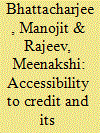| Srl | Item |
| 1 |
ID:
133884


|
|
|
|
|
| Publication |
2014.
|
| Summary/Abstract |
It is well known that around 80 per cent of farmers in India are in the small or marginal farmers group which requires financial resources on a regular basis for their farming activities. Needless to say, as these households do not possess adequate savings, accessibility to financial resources at reasonable terms and conditions from financial intermediaries becomes a crucial parameter for their productive activities and hence, in turn, their well-being. Based on the 59th round of household-level data from the Debt and Investment Survey and the Situation Assessment Survey (SAS) of farmers provided by the National Sample Survey Organisation (NSSO) of India, this article examines the nature of exclusion faced by farmer households in credit markets across selected prominent states of India. This is done by constructing an indicator, namely, the 'incidence of borrowing'. This article also tries to identify the factors that explain exclusion from access to financial resources by developing a methodology for the detection of credit exclusion. Our results show that the relation between the cost of credit (interest rate) and access to credit depends heavily on the extent of prevalence of informal lenders in a region.
|
|
|
|
|
|
|
|
|
|
|
|
|
|
|
|
| 2 |
ID:
097013


|
|
|
|
|
| Publication |
2010.
|
| Summary/Abstract |
This article theoretically examines the potential effect of product patent on the availability of an essential drug in developing countries like India. Previous studies have indicated the possibility of a product patent making a drug unavailable in a developing nation. This has been shown under the uniform pricing policy adopted by the multinational company (MNC) that produces the drug. Allowing for price discrimination and comparing it with the above situation, we have argued that the problem of non-availability of a patented drug is, indeed, much less serious. However, successful price discrimination is not possible when markets are not perfectly segmented and "parallel trade" (a form of arbitrage) by the distributors exists. Our model incorporates such a possibility and establishes that even in the presence of parallel trade, the MNC can earn higher profits by supplying the drug to both the developed and the developing nations than by confining itself to the markets of developed countries.
|
|
|
|
|
|
|
|
|
|
|
|
|
|
|
|